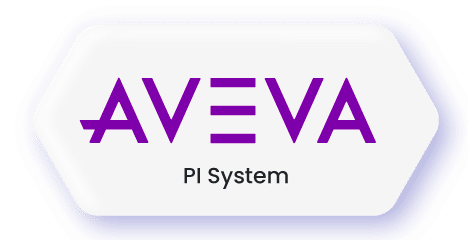Follow us on our social networks
Smart
Manufacturing
Smart
Manufacturing
Smart
Manufacturing
Improving manufacturing efficiency, flexibility, and performance powered by Industry 4.0 technologies.
Smart manufacturing is revolutionizing the way modern industries operate by combining cutting-edge and traditional technologies to streamline processes and optimize performance.
Through the integration of technologies such as advanced analytics, the Industrial Internet of Things (IIoT), MES (Manufacturing Execution Systems) and process historians, smart manufacturing creates a highly interconnected and data-driven environment that enables businesses to make more informed decisions, improve efficiency, and reduce costs. This connectivity also prepared the path for plant-to-business integration, enabling businesses to achieve end-to-end visibility into their operations and supply chains. With smart manufacturing, businesses can scale their operations more,
effectively even across multiple sites, by standardizing processes and workflows, sharing data and insights, and optimizing performance across the entire organization.
Omnicon specializes in providing comprehensive smart manufacturing solutions to serve your manufacturing operations needs. Our expertise in manufacturing workflow orchestration, MES/MOM, and data management and analytics allows us to offer customized solutions that meet the specific needs of each client. Whether you need to improve the efficiency of your processes, optimize your value chain or gain deeper insights into your operations, we have the expertise and experience to help you achieve your goals.
Our Smart Manufacturing
Solution Architecture
Solution architecture consulting is a valuable approach for organizations that lack the in-house expertise or resources to design and implement software solutions. We bring specific experience and knowledge to help organizations design and construct the best solution for their problems, improving their processes and increasing the efficiency of their operation along the way.
At Omnicon, we work closely with clients to understand their business needs, goals, and restrictions to design and develop a software solution that meets those needs.
Based on the solution scope, our architectural consultancy services typically include:
Identifying the specific business processes and manufacturing operations requirements that the software solution needs to address.
Developing a detailed design of the software solution, including specifications of user interfaces, data Integration, data storage, and processing requirements.
Designing the solution architecture, along with the overall structure of the system and the interactions between different components. This encompasses defining the hardware and software components that will be used to build the system, as well as how they will be integrated and configured.
Researching and comparing different Smart Manufacturing solution providers to find the one that best aligns with the needs of the organization.
Benefits of Omnicon Solution Architecture Consulting
Choosing Omincon as a partner for manufacturing solutions will help organizations to design and develop solutions that meet their specific needs and improve their overall performance, efficiency, and competitiveness.
Expertise: We bring a high level of expertise to the table. With a deep understanding of the latest technologies, design methodologies and optimal practices, we create a solution that meets the specific needs of the organization.
Efficiency: Omnicon offers the resources and experience needed to design and develop solutions quickly and efficiently, paying close attention to saving the organization time and money.
Scalability: Flexible solutions available that can be scaled to meet the organization’s changing needs, allowing the organization to be responsive and adaptable to market changes.
Innovation: Omnicon brings new perspectives to the table that help organizations innovate and stay ahead of the competition.
MES
In today’s highly competitive manufacturing landscape, staying ahead of the competition requires more than just producing high-quality products. It requires optimizing production processes and leveraging data-driven insights to make informed decisions. Yet many manufacturers struggle to achieve these goals due to the lack of an effective MES solution.
At Omnicon, we understand that every manufacturing operation is unique, with its own set of challenges, including limited visibility into operations and asset utilization, difficulty tracking production progress and quality, and inefficient resource allocation. That is why we can offer a full MES implementation for those looking for a comprehensive solution, or a modular and scalable approach for those who want to focus on specific areas such as Performance Management, Tracking and Genealogy, or Production Management.
Whether you choose a full MES implementation or a modular approach, we help our clients with:
Increasing Efficiency :
Setting targets and monitoring progress through production output, efficiency, quality and overall equipment effectiveness (OEE) can help identify areas for improvement such as equipment downtime, production bottlenecks, and material waste.
Improving Quality:
MES facilitates the tracking of every aspect of the production process, from raw materials to finished goods, ensuring consistent quality and compliance with industry standards and regulations.
Product Tracking:
MES allows to track the movement of products and materials throughout the production process, from raw materials to finished goods. This level of visibility provides a clear understanding of the origin and quality of products, as well as any associated processes and materials.
Reduced Costs:
By monitoring and analyzing data on cost-related metrics, such as scrap and downtime, manufacturers can realize significant cost savings over time.
Data-Driven Decision Making:
Access to real-time data on production performance enables manufacturers to make informed decisions about production schedules, resource allocation, and process improvements, leading to improved productivity, quality, and profitability.
Efficient Product Dispatching:
With real-time data on equipment status, inventory levels, production schedules, and shipping requirements, product dispatching can be efficiently managed. This information facilitates the optimization of the processes, prioritize orders, and minimize lead times.
Manufacturing Workflow
Workflow management is a critical component of modern manufacturing operations, particularly when there are multiple systems and information silos that need to be orchestrated, and also manual processes that are still done manually and require digitization.
With the increasing complexity of manufacturing systems, it can be challenging to achieve the desired efficiency and productivity levels.
Omnicon solutions provide an automated and integrated system for managing the manufacturing process from start to finish, reducing manual errors and delays, and enabling manufacturers to increase operational efficiency and optimize plant productivity by standardizing, digitizing and orchestrating their operations.
With an end-to-end transformational approach in alignment with international standards, such as ISA-95 to provide a digital framework for workflow management and plant-to-business integration, our solutions are deployed as modular applications replicable at a multi-site scale driving the digital transformation of manufacturing operations.
Omnicon empowers clients with workflows management solutions and value-added services aimed to achieve:
Standardized Processes:
Establishing standard procedures and workflows help to scale-up across multiple manufacturing facilities or production lines, ensuring consistency in operations, and reducing variability in product quality.
Orchestration:
Streamline manufacturing operations and optimize plant productivity, orchestrating processes and coordinating data exchange across systems and people in a consistent and governed manner.
Digital Processes:
Digitize manufacturing workflows and processes with our innovative solutions, eliminating manual tasks, such as data entry or manual inspections, and enabling real-time data capture and analysis for improved decision-making, efficiency, and compliance.
Systems Integration:
Retrieving and sharing information from various systems, depending on workflow execution, enables contextualized information sharing and real-time connectivity between the shop floor and the business level. This eliminates information silos and ensures accurate and timely data exchange between different areas and systems, improving collaboration and productivity.
Data Management
At the heart of modern manufacturing lies the need for effective data management and analytics. It involves collecting data from diverse sources such as sensors, machines, IoT devices, and other equipment, then storing, organizing, and securing that data in a way that makes it readily available for analysis.
With vast amounts of data generated in the plant floor that can be easily collected by systems such as process historians, combined with data from the manufacturing level, organizations have the potential to drive a wide range of initiatives, from basic reporting and dashboards to advanced analytics that enable predictions and data-driven decision-making.
Despite the wealth of data generated, many manufacturers struggle to fully leverage their operational data. One of the main reasons is the lack of proper automation systems in place, leading to inefficient and manual data collection processes.
Additionally, the lack of connectivity and integration between multiple systems often results in data silos, making it difficult to access and analyze data. IT/OT convergence issues can also pose challenges as they require close collaboration between IT and OT teams to effectively manage and leverage data.
By offering a comprehensive range of solutions in industrial automation and smart manufacturing, we provide expertise in data management and analytics to help our clients to overcome those obstacles and enable them to turn data into actionable insights that drive the business forward.
Predictive Maintenance:
By analyzing historical data from equipment sensors, manufacturers can identify potential issues and anticipate failures in critical assets before they lead to unplanned downtime, minimizing disruptions to production and reducing maintenance costs.
Process Optimization:
With the power of analytics, manufacturers can identify the optimal process parameters and conditions that lead to the highest quality products, maximum output, minimum waste and increased yield. In batch processing, this can help create a consistent “golden batch” that meets or exceeds quality standards by replicating the ideal conditions in future batches.
Quality Control:
By analyzing production data, including variables such as temperature, pressure, and flow rate, manufacturers can identify patterns and trends that may impact product quality. Real-time monitoring of these variables can help prevent quality issues by setting up automated alerts and triggers that generate notifications of any anomalies or deviations.
Energy Management:
Analytics can help to monitor and optimize energy usage across the entire production process, from raw materials to finished goods. By identifying areas of high energy consumption and waste, manufacturers can make data-driven decisions to reduce their carbon footprint and improve sustainability. This can lead to cost savings through reduced energy consumption and improved environmental performance, while also helping manufacturers to meet sustainability goals and comply with regulatory requirements.
Technology Offerings







